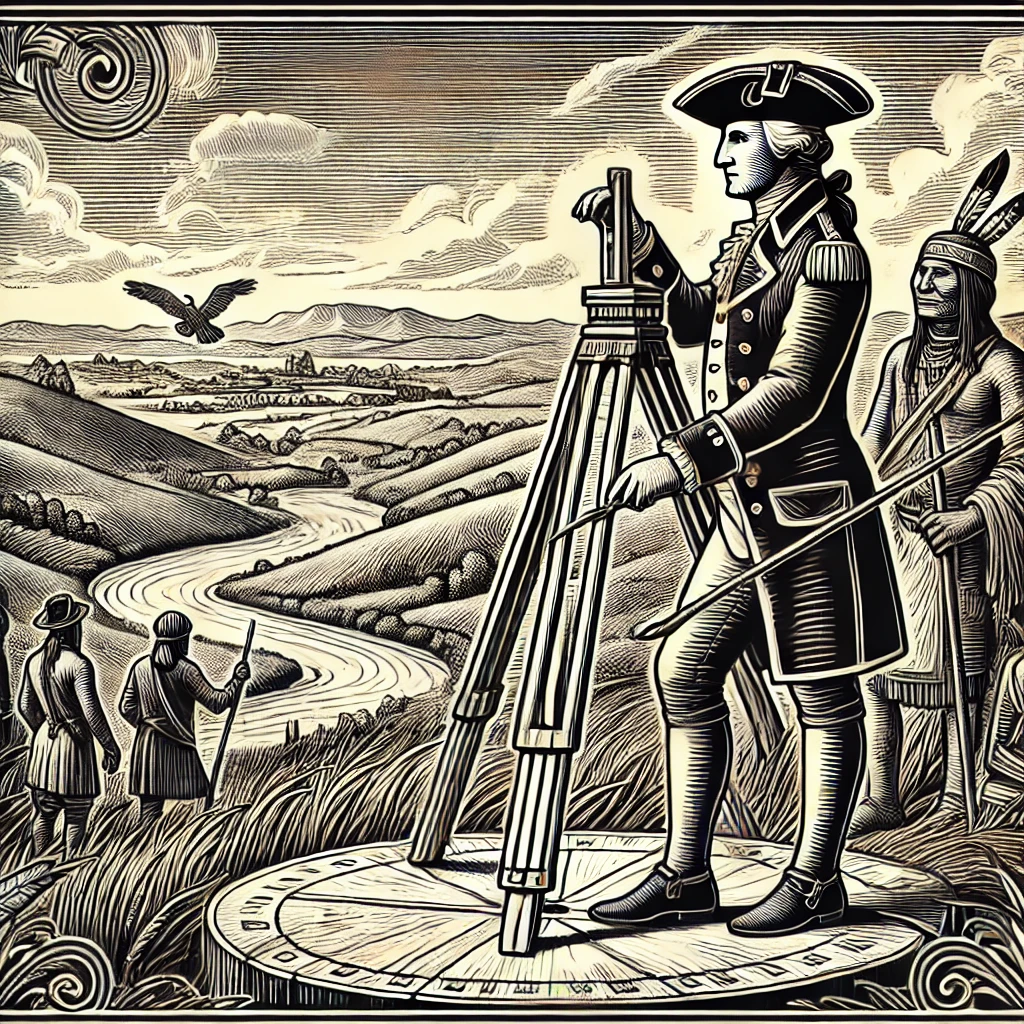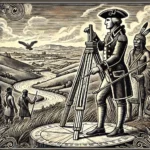
- arrow_back Home
- keyboard_arrow_right Business Finance & Crypto
George Washington: Early Entrepreneur & Visionary, But at What Cost?
Business Finance & CryptoCelebrityEntrepreneur 19 nezix January 27, 2025

How Can You Support Geek.Report?
Our staff covers trending tech news & reviews and tests popular tech products and services daily (Yes…we are HUGE geeks and love this stuff!) If you make a purchase using our links, we may earn a commission (and will be super grateful!)
When we think of George Washington, the first images that come to mind are powdered wigs, revolutionary battles, and the enduring cherry tree myth. But did you know that America’s first president was also a savvy entrepreneur and land speculator? Before Washington became the Father of His Country, he was a shrewd businessman with a keen eye for opportunity. Unfortunately, that opportunity (and wealth generation in general) during this period of American history often came at a steep human cost. Join us as we uncover some of the harsher realities of early American entrepreneurs like George Washington and reflect on the good, the bad, and the ugly truths associated with an American legacy.
The Speculator’s Playground
By the mid-18th century, the American colonies were bursting at the seams, with settlers itching to move westward beyond the Appalachian Mountains. George Washington, always one to think big, saw enormous potential in this migration. Having gained intimate knowledge of the western frontier during his time as a surveyor for Lord Fairfax, he was well aware of the vast, untapped tracts of land available for development.
But there was a catch: King George III issued a proclamation in 1763 forbidding the settlement of Indian lands, a move meant to avoid conflict with Native American tribes. Washington’s response? He carefully sidestepped the rule, encouraging settlers to quietly hold their ground, writing, “Keep this whole matter a profound secret … because I might be censured for the opinion I have given in respect to the King’s proclamation.” Translation? Don’t ask for permission—ask for forgiveness later.
A Calculated Gamble
Washington’s land ambitions didn’t stop at theory. In 1770, he personally explored the Ohio and Great Kanawha River regions by canoe, scouting fertile bottomlands. When the restrictions on land claims were lifted, Washington quickly secured over 30,000 acres, envisioning a thriving settlement teeming with farmers and settlers. He even planned to lease out the land to tenants, proving he had an entrepreneurial mindset far ahead of his time. However, the reality was far more complicated. Many of his tenants struggled to make the land productive, leading to challenges in collecting rents. Additionally, Washington’s land holdings became a source of disputes, with claims of neglect and difficulties in managing such a vast estate. Despite these setbacks, his ventures laid the groundwork for future agricultural development in the region and further westward expansion of the North American continent.
Friends in High Places
Washington wasn’t the only Founding Father dabbling in land speculation. Benjamin Franklin, Patrick Henry, and others also pursued western lands, lobbying British and colonial governments to secure favorable grants. These ventures were high-stakes—and sometimes controversial. Washington’s efforts, while ambitious, occasionally led to legal disputes over claims of neglect and mismanagement.
The Young Republic: Land as the New Gold
After the Revolutionary War, the game changed. Land speculation became a cornerstone of the young nation’s economy. The Declaration of Independence even criticized King George for obstructing westward expansion. Congress, now free from British oversight, sought to make western lands accessible—though not without controversy. Washington, always a step ahead, understood that the future of America lay in its vast frontier.
Troubling Aspects of Wealth Generation During Early Colonial American History
Much of Washington’s wealth came from Mount Vernon, his sprawling estate in Virginia, which boasted productive tobacco and wheat farms worked (unfortunately) by enslaved laborers. This reliance on enslaved individuals underscores the human cost of wealth generation during that era. Enslaved people provided the labor that allowed estates like Mount Vernon to thrive, yet they endured unimaginable hardships, deprivation of freedom, and systemic oppression. Washington’s management style is reported to have sometimes included strict discipline, and he is noted to have even pursued enslaved individuals who sought freedom, as seen in the case of Ona Judge.
On a slightly brighter note, it is worth mentioning that later in his life, Washington’s attitude towards slavery began to shift. In his will, he made provisions to free all the enslaved individuals he personally owned upon the death of his wife, Martha Washington. This action was rare among his peers and suggested a growing discomfort with the institution of slavery, though it may have come too late to address the suffering endured during his lifetime. This remains a deeply troubling aspect of not just his legacy but of our American legacy as a whole, which highlights the complexities of wealth during this period of westward expansion in early colonial American history.
Acknowledging the Native American Perspective
While Washington and other Founding Fathers saw opportunity in westward expansion, it’s important to acknowledge the profound impact this had on Native American communities. In addition to his agricultural pursuits (and the human cost of the slave labor involved), Washington’s extensive land acquisitions often resulted in the displacement of Native American tribes. As settlers moved westward to occupy the land Washington and other speculators claimed, Native communities were frequently forced off their ancestral territories, disrupting their cultural and economic practices. This process, deeply rooted in the broader westward expansion, highlights the inequities and conflicts that accompanied the creation of wealth during this era. The concept of land ownership was foreign to many tribes, who often viewed land as a shared resource rather than something to be bought or sold. Treaties and agreements signed with Native Americans were frequently misunderstood or outright ignored, leading to displacement, loss of resources, and broken promises.
For Native Americans, the westward push was not just an economic opportunity but a devastating upheaval of their way of life. Tribes were forced to cede lands they had lived on for generations, often under duress or through agreements that failed to reflect their understanding of land transfer agreements.
George Washington’s Net Worth: Then and Now
George Washington was one of the wealthiest individuals of his time, with his wealth stemming from a combination of land holdings, farming, and investments. At the height of his prosperity, his net worth was estimated to be roughly $500,000 in 18th-century dollars—a staggering sum for the era. Additionally, he owned over 70,000 acres of land by the time of his death. Using the modern average value of U.S. farmland at roughly $4,000 per acre, his land holdings alone would be valued at an incredible $280 million today (and likely even more considering the areas he owned property). Combined with other assets and inflation-adjusted wealth, Washington’s net worth likely exceeded $500 million in today’s terms, firmly placing him among the wealthiest figures in American history. What we must ask ourselves today as we reflect on these staggering sums is at what cost were they acquired?
Lessons for Today’s Entrepreneurs
The story of early American colonial expansion reminds us of the importance of considering the long-term effects of our actions. Modern entrepreneurs should strive to balance monetary gain with the overall good for all people involved, ensuring their work uplifts communities rather than causing harm. Reflecting on history, we see how better understanding and respect for Native American values and land stewardship could have fostered more equitable outcomes. We also find that as Americans our legacy is a complex one, riddled with the harsh realities of slave labor tied to the generation of historical wealth and expansion. Although we may not agree with the tactics he used, it is hard to deny that Washington played a pivotal role in shaping the nation and paving the way for the modern America we know today. We can appreciate individuals such as Washington as dynamic and complex by nature, praising him for his role in defending our fledgling nation from the British and leading our nation as it’s first President, but condemning him for going along with practices that displaced Native Americans and enslaved plantation workers. As the leader of our country, we would have hoped he could have set a better example for others to follow, but it is an extremely difficult task to place ourselves in history with the customs and culture of the time. What we can appreciate, is the fact that at least, an older and wiser Washington had begun to recognize the evils of slavery when he agreed to free all of his slaves in his will. It speaks to the myriad and dynamic natures of our human heart’s in general – the good and the bad that each one of us struggles with on a daily basis. It should also encourage us to take action when we see injustice and not just to allow it to happen or go along with it because it is easier or common as Washington did.
These darker aspects of America’s earliest entrepreneurs and expansionism remind us of the importance of listening to and learning from diverse perspectives as we reflect on history, so that we will not repeat the mistakes of the past, but instead learn from them, so that we can pave the way to a better, more equitable future together.
Sources & Additional Information For This Article:
Here is a compiled list of sources that can be referenced for the article:
- Mount Vernon Estate Records – Information about George Washington’s land ownership, Mount Vernon’s operations, and enslaved laborers.
Source: Mount Vernon Official Website - Library of Congress – Details on Washington as a land speculator, including his surveying work and property acquisitions.
Source: Library of Congress - Declaration of Independence and Historical Context – Criticism of King George III for obstructing westward expansion and its implications.
Source: National Archives - Ona Judge’s Escape – The story of Ona Judge, an enslaved woman who escaped from Mount Vernon, providing insight into Washington’s pursuit of escaped enslaved individuals.
Source: Smithsonian Magazine - Washington’s Will and Slave Manumission – Insights into Washington’s provisions to free his enslaved workers.
Source: George Washington’s Mount Vernon - Historical Farmland Value Estimates – Modern value per acre calculations for Washington’s land holdings.
Source: USDA Farmland Value Reports - Impact on Native American Tribes – Historical records of displacement and treaties affecting Native American tribes during westward expansion.
Source: National Museum of the American Indian - Economic Context of Colonial America – The role of land speculation in the early American economy.
Source: American Economic Review
Search Geek.Report
-
Trending Right Now
- Get Smartphone Alerts When Your Snail Mail Arrives?!
- Gratitude – A Sacred Medicine For Our Souls
- 🚀 Silicon Valley: A Timeline of Geeks In History
- DeepSeek’s Meteoric Rise and The International War For AI Supremacy
- Intel Core i9-12900K vs. AMD Ryzen 7 7700X: Feb 2025 CPU Battle
- OpenAI’s $14 Million Dollar Super Bowl Ad Explained
- Nvidia RTX 5090 vs. RTX 4090: Unleashing the Next‑Gen GPU Revolution
- OpenAI’s o3-mini: The Affordable AI That Actually Thinks Before It Speaks
- 💡 Helion Energy’s Bold Bet: Fusion Power by 2028?
- The WHOLE Story of The Friends Thanksgiving Trifle Disaster Finally Comes Out!
- Should You Tip Walmart Delivery Drivers? A Guide to Grocery Delivery Orders vs. Walmart.com Shipping Orders
- Nvidia Loses Nearly $600 Billion in Single Largest Market Drop Ever as DeepSeek AI Disrupts Industry
- 🌴 Palm Jumeirah is the Epitome of Dreaming Big
- Meet Liang Wenfeng – The Mysterious Billionaire Behind DeepSeek’s AI Takeover 🤯🚀
- George Washington: Early Entrepreneur & Visionary, But at What Cost?
Tags
Categories
 Tech Crunch
Tech Crunch- All the biggest news from AWS’ big tech show re:Invent 2025 December 3, 2025Amazon Web Services giant tech conference is happening this week with news ranging from chips to AI services.Rebecca Szkutak, Julie Bort, Kirsten Korosec
- Amazon challenges competitors with on-premises Nvidia ‘AI Factories’ December 3, 2025If the product name sounds familiar, it should. It's a collab with Nvidia that combines AWS tech with the chip maker's tech.Julie Bort
- Bending Spoons agrees to buy Eventbrite for $500M to revive stalled brand December 2, 2025The acquisition price for the events marketplace is a fraction of the $1.76 billion valuation it achieved during its 2018 IPO.Marina Temkin
- Kalshi raises $1B at $11B valuation, doubling value in under two months December 2, 2025The latest funding comes less than two months after Kalshi announced that it raised $300 million at a $5 billion valuation.Marina Temkin
- Google tests merging AI Overviews with AI Mode December 2, 2025Google is testing how to make it easier to move from search to an AI chat in a new global test.Sarah Perez
- All the biggest news from AWS’ big tech show re:Invent 2025 December 3, 2025
About Geek.Report
Geek.Report focuses on trending tech news covering a wide range of topics from Artificial Intelligence, Apps & Software Tools, Hardware & Electronics, Business & Finance, Gaming, Mac & PC, Science, Space, Entrepreneurship, Comedy, Entertainment, Music, Product & Service Reviews, Automotive and more! Get ready to geek out on your favorite tech topics with your oh so geeky Geek.Report staff!
Site Links

Join us as we embark upon a quest to unlock the secrets of the universe and save humanity from the galactic empire (or itself) as we try our best to have a little fun doing it!
Copyright 2025-2035 Geek.Report LLC All Rights Reserved.




Be the first to leave a comment